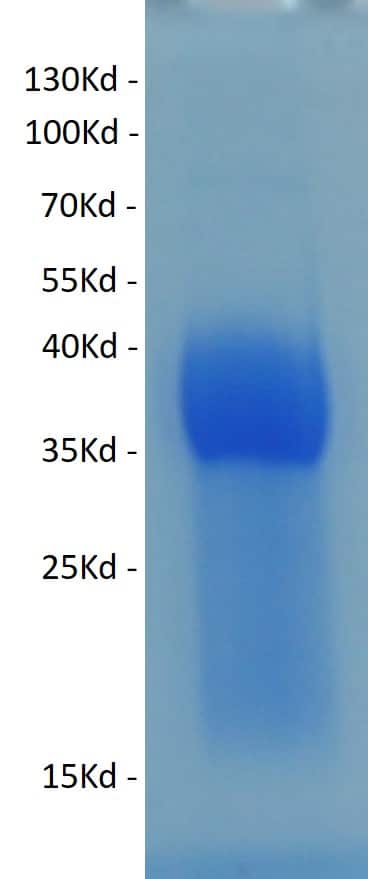2019-nCoV Spike RBD
19Cov-S12019Cov-S120
Price range: $250.00 through $1,000.00
| Protein Name | 2019-nCoV Spike RBD |
| Catalog Number | 19Cov-S12019Cov-S120 |
| Purity | 95% or above |
| Protein Construction | A DNA sequence encoding the SARS-CoV-2 (2019 nCoV) spike protein receptor binding domain (Arg319-Phe541) |
| Endotoxin | <0.1 EU per ug of protein as determined by LAL method |
| Origin Species | Coronavirus (2019-nCoV) isolate Wuhan-Hu-1 |
| Expression Host | HEK293F |
| Protein type | Recombinant |
| Purification tag | C-terminal 6xHis-tag |
| Molecule Mass | Predicted molecular weight 24.7 kD. |
| Formulation | PBS |
| Regulation restrictions | For research use only |
| Shipping | Recombinant proteins are provided as frozen liquid and will be shipped out with dry ice. |
| Stability and storage | The protein is stable in a liquid state at -70℃ for 12 months. Avoid repeated freeze-thaw cycles. |
Additional information
| Size | 100µg, 1mg |
|---|
Background information
The SARS-CoV-2 (2019-nCoV) Spike RBD (receptor binding domain) has been identified as the key viral element allowing the virus docking to the target cells. RDB is recognized by the ACE2 surface membrane receptor [1-3]. RBD is a candidate for subunit prophylactic vaccines against SARS-CoVs [4, 5]. RBD is also at the center of therapeutic approaches, such as the development and testing of small peptide inhibitors or soluble ACE2 to block the SARS-CoV-2 entry into target cells [6].
References:
- Li F., 2016. Structure, function, and evolution of coronavirus spike proteins. Annu. Rev. Virol. 3:237-261.
- Li F. et al., 2005. Structure of SARS coronavirus spike receptor-binding domain complexed with receptor. Science. 309:1864-1868.
- Walls A.C. et al., 2020. Structure, function, and antigenicity of the SARS-CoV-2 spike glycoprotein. Cell. 181(2):281-292.e6.
- Wang N. et al., 2020. Subunit vaccines against emerging pathogenic human coronaviruses. Front. Microbiol. 11:298. DOI: 10.3389/fmicb.2020.00298.
- Padron-Regalado E., 2020. Vaccines for SARS-CoV-2: Lessons from other coronavirus strains. Infect. Dis. Ther. DOI: 10.1007/s40121-020-00300-x.
- Monteil V.et al., 2020. Inhibition of SARS-CoV-2 infections in engineered human tissues using clinical-grade soluble human ACE2. Cell. 181:1-9.
Document
| Datasheet | Download |

Reviews
There are no reviews yet.